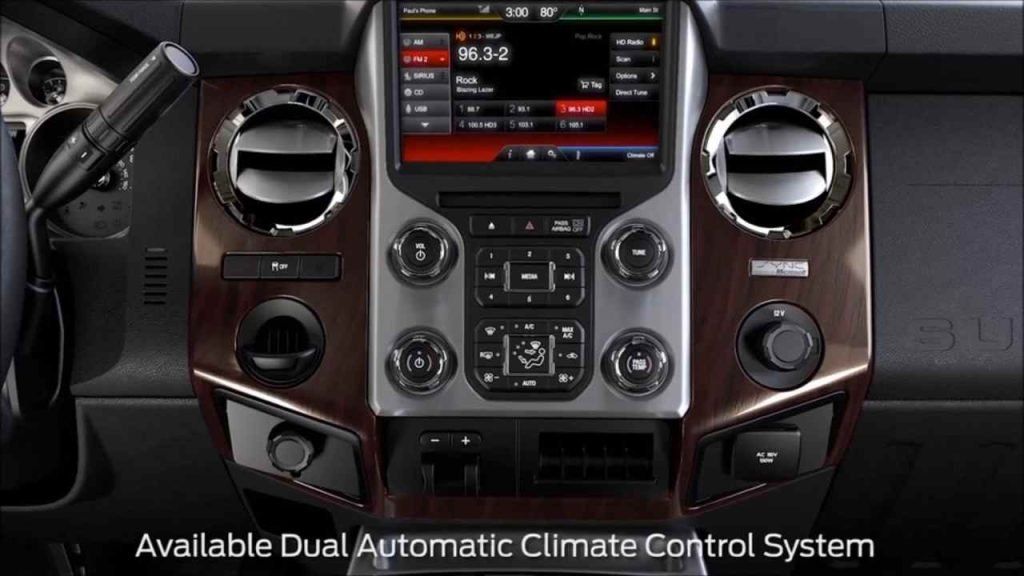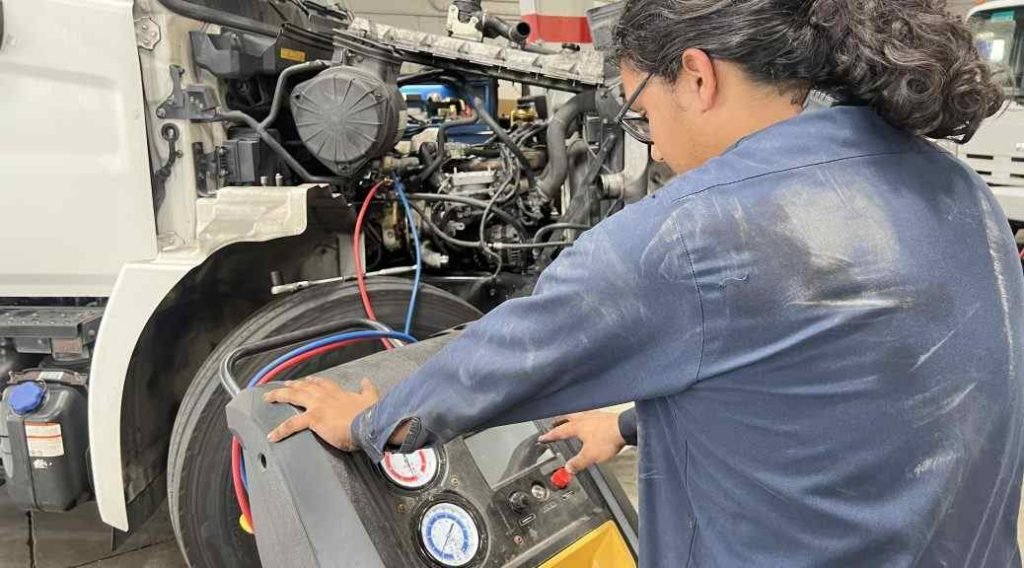Looking to keep cool (or warm) on your trucking journeys? At Go-go Logistics & Transport LLC, we’ve got you covered, even if you’re rocking dual-zone climate control! Our expert technicians are equipped to handle a wide range of AC system repairs, including those with dual-zone functionality. Whether it’s diagnosing a pesky refrigerant leak, fine-tuning temperature sensors, or replacing faulty components, we’ll get your truck’s climate control back to peak performance. Trust us to keep your truck’s climate just right, no matter the conditions outside!

Say goodbye to sweating or shivering behind the wheel and hello to comfortable travels with our specialized AC repair services. Our team understands the importance of a properly functioning AC system, especially during long hauls or extreme weather conditions. With our expertise, you can count on consistent and reliable cooling or heating, ensuring a pleasant driving experience every time you hit the road.
Importance of AC Systems in Trucks
The link between truck A/C performance and driver comfort is crucial, especially during long hauls or hot climates. A properly functioning AC system not only provides comfort but also reduces fatigue, improves focus, and enhances safety. Additionally, it creates a conducive environment for transporting perishable goods and sensitive cargo. Without reliable cooling or heating, drivers may face discomfort, distraction, and potential health risks. Therefore, regular maintenance and timely repairs are essential to keep the AC system in optimal condition, ensuring a pleasant and safe driving experience.
Understanding Dual-Zone Climate Control
Winterizing your truck’s A/C system involves understanding dual-zone climate control. This feature allows personalized comfort with separate temperature preferences for different cabin zones, catering to individual comfort levels. It works through specific temperature sensors, air ducts, and control mechanisms, offering flexibility and convenience for occupants. Understanding these workings is key to optimizing comfort during winter travels, ensuring a pleasant environment for everyone on board.
Common Issues with Truck AC Systems
Early identification and professional repairs prevent further damage, ensuring consistent AC system performance and driver comfort during travels. Troubleshooting truck A/C problems on the road involves recognizing common issues such as refrigerant leaks, compressor failures, and sensor inaccuracies. These problems, caused by wear and tear or environmental factors, can lead to reduced cooling/heating efficiency or complete system failures.
Signs of AC System Problems
Recognizing signs of AC system problems is crucial for timely intervention and repairs. Common indicators include weak airflow, warm air blowing from vents, strange odors, unusual noises (such as rattling or squealing), fluctuating temperature settings, and visible leaks under the truck. Drivers may also notice that the AC system takes longer to cool or heat the cabin than usual. Being attentive to these signs allows drivers to seek professional assistance before minor issues escalate into major AC system failures.
Benefits of Professional AC Repairs
Opting for professional AC repairs offers numerous benefits, including accurate diagnosis, quality repairs, and warranty protection on parts and services. Professional technicians have the expertise, tools, and access to OEM (Original Equipment Manufacturer) parts required to address complex AC system issues effectively. They can perform comprehensive diagnostics, identify underlying problems, and provide tailored solutions to restore optimal functionality to the AC system. Professional repairs also ensure safety, reliability, and long-term performance, enhancing the overall comfort and satisfaction of truck drivers and passengers.

Diagnostic Process for Dual-Zone Climate Control
The diagnostic process for dual-zone climate control involves a systematic approach to assess each component of the system. Technicians use specialized tools and equipment to perform tests on temperature sensors, actuators, control modules, and HVAC (Heating, Ventilation, and Air Conditioning) components. They check for error codes, conduct visual inspections, and analyze data to pinpoint issues affecting the dual-zone functionality. This thorough diagnostic process enables technicians to accurately identify the root cause of problems and recommend appropriate repairs or adjustments for optimal dual-zone climate control performance.
Repairing Refrigerant Leaks
Refrigerant leaks can significantly impact the cooling efficiency of an AC system. Repairing refrigerant leaks involves locating the source of the leak, repairing or replacing damaged components, and recharging the system with the correct amount of refrigerant. Technicians use leak detection tools and methods such as UV dye tests or electronic leak detectors to pinpoint leaks in the refrigerant lines, condenser, evaporator, or connections. Proper repair of refrigerant leaks restores the AC system’s cooling capacity, prevents further refrigerant loss, and ensures environmental compliance with refrigerant handling regulations.
Addressing Temperature Sensor Issues
Temperature sensors play a crucial role in maintaining the desired cabin temperature in a truck’s AC system. When temperature sensor issues arise, such as inaccurate readings or sensor failures, it can lead to improper cooling or heating performance. Technicians troubleshoot temperature sensor problems by testing sensor outputs, checking wiring connections, and calibrating sensors as needed. Addressing temperature sensor issues ensures accurate temperature control within the cabin, enhances comfort for occupants, and optimizes the overall efficiency of the AC system.
Replacing Faulty AC Components
Faulty AC components such as compressors, condensers, evaporators, or blower motors can significantly impact the performance of the entire AC system. When these components malfunction, they may cause reduced cooling/heating output, unusual noises, or system failures. Technicians assess the condition of AC components through visual inspections, diagnostic tests, and performance evaluations. Replacing faulty AC components with high-quality, compatible parts restores the system’s functionality, improves energy efficiency, and prolongs the lifespan of the AC system.
Testing and Calibration for Optimal Performance
After completing repairs or component replacements, technicians perform testing and calibration procedures to ensure the AC system operates at optimal performance levels. This involves verifying temperature settings, airflow distribution, refrigerant pressures, and system responsiveness to control inputs. Calibration adjustments may be made to fine-tune temperature controls, airflow direction, or sensor readings for accurate climate control. Thorough testing and calibration help validate the effectiveness of repairs, identify any remaining issues, and guarantee that the AC system functions reliably under various operating conditions.
Maintenance Tips for Long-Term AC System Health
Maintaining a healthy AC system in trucks requires regular maintenance and care. Drivers can follow these maintenance tips to prolong the lifespan and efficiency of their AC systems:
- Regularly inspect and clean air filters to ensure proper airflow.
- Check refrigerant levels and recharge as needed according to manufacturer specifications.
- Keep condenser coils clean and free from debris to facilitate heat exchange.
- Monitor temperature settings and airflow performance for any deviations or anomalies.
- Schedule periodic inspections and maintenance with qualified technicians to detect and address potential issues early.
- Follow recommended service intervals for AC system components, such as compressor lubrication or belt replacements, based on mileage or operating hours.
Implementing these maintenance practices promotes long-term AC system health, reduces the risk of costly repairs, and ensures continuous comfort for truck occupants throughout their journeys.
Conclusion
In conclusion, understanding the intricacies of truck AC systems, especially those with dual-zone climate control, is essential for maintaining comfort, efficiency, and safety on the road. By recognizing common issues, seeking professional repairs, and following regular maintenance practices, drivers can ensure optimal performance from their AC systems. Professional diagnostics, repairs, and component replacements address specific issues like refrigerant leaks, temperature sensor malfunctions, and faulty components, restoring the system’s functionality and enhancing overall comfort for drivers and passengers. Emphasizing timely intervention, regular inspections, and adherence to manufacturer guidelines for maintenance fosters long-term AC system health, reduces the risk of unexpected breakdowns, and promotes a comfortable driving experience regardless of external weather conditions or travel durations.
FAQs
What are common signs of AC system problems in trucks? Common signs include weak airflow, warm air from vents, unusual odors, strange noises, and visible leaks. These indicators suggest underlying issues that require professional diagnosis and repair.
2. How does dual-zone climate control benefit truck occupants? Dual-zone climate control allows drivers and passengers to set different temperature preferences for separate cabin zones, enhancing comfort and personalizing climate settings.
3. What are the benefits of professional AC repairs for trucks? Professional repairs offer accurate diagnosis, quality repairs using OEM parts, warranty protection, and improved safety and comfort during travels.
4. How can truck drivers maintain their AC systems for optimal performance? Regular maintenance practices such as cleaning air filters, monitoring refrigerant levels, keeping condenser coils clean, and scheduling periodic inspections with qualified technicians help maintain AC system health.
5. What should drivers do if they notice AC system issues while on the road? If drivers notice AC system issues like reduced cooling/heating or unusual noises while driving, they should safely pull over, avoid DIY repairs, and seek assistance from qualified technicians to prevent further damage and ensure safe travels.